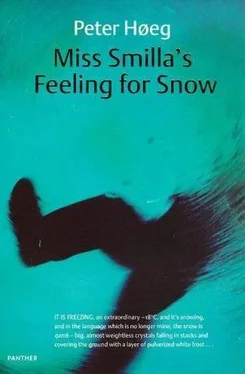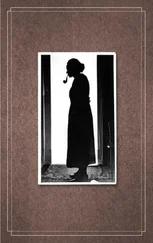Peter Høeg - Smilla's Sense of Snow aka Miss Smilla's Feeling for Snow
Здесь есть возможность читать онлайн «Peter Høeg - Smilla's Sense of Snow aka Miss Smilla's Feeling for Snow» весь текст электронной книги совершенно бесплатно (целиком полную версию без сокращений). В некоторых случаях можно слушать аудио, скачать через торрент в формате fb2 и присутствует краткое содержание. Жанр: Современная проза, на английском языке. Описание произведения, (предисловие) а так же отзывы посетителей доступны на портале библиотеки ЛибКат.
- Название:Smilla's Sense of Snow aka Miss Smilla's Feeling for Snow
- Автор:
- Жанр:
- Год:неизвестен
- ISBN:нет данных
- Рейтинг книги:3 / 5. Голосов: 1
-
Избранное:Добавить в избранное
- Отзывы:
-
Ваша оценка:
- 60
- 1
- 2
- 3
- 4
- 5
Smilla's Sense of Snow aka Miss Smilla's Feeling for Snow: краткое содержание, описание и аннотация
Предлагаем к чтению аннотацию, описание, краткое содержание или предисловие (зависит от того, что написал сам автор книги «Smilla's Sense of Snow aka Miss Smilla's Feeling for Snow»). Если вы не нашли необходимую информацию о книге — напишите в комментариях, мы постараемся отыскать её.
Smilla's Sense of Snow aka Miss Smilla's Feeling for Snow — читать онлайн бесплатно полную книгу (весь текст) целиком
Ниже представлен текст книги, разбитый по страницам. Система сохранения места последней прочитанной страницы, позволяет с удобством читать онлайн бесплатно книгу «Smilla's Sense of Snow aka Miss Smilla's Feeling for Snow», без необходимости каждый раз заново искать на чём Вы остановились. Поставьте закладку, и сможете в любой момент перейти на страницу, на которой закончили чтение.
Интервал:
Закладка:
"But what pride would children have in a father who lets his ass get kicked the first time his job is threatened?" I say nothing.
"Assistant chief pathologist can't be the only decent way to make a living. My grandmother was Jewish. Maybe I can take care of the toilets at the Mosaic Cemetery."
He's thinking out loud. But he has already made up his mind.
In the kitchen he stops short.
"Year and date of the two expeditions?" I give them to him.
"It might be informative to look at the forensic medical reports," he says.
The first pastries have come out of the oven. One is shaped like a naked woman. They used raisins for the nipples and pubic hair.
"Look," a little boy says to me, "it's supposed to be you."
"Yes," says another one. "Take off your clothes so we can see if it looks like you."
"Shut up," says Lagermann.
He helps me with my coat. "My wife thinks that no circumstances warrant giving your kids a couple of swats."
"In Greenland," I say, "they don't hit children, either." He looks disappointed. "But it must be damned human to feel tempted."
The mechanic is waiting on the sidewalk. The two men shake hands. In an attempt to reach each other, the forensics expert stretches up in the air while the mechanic hunches down toward the ground. They meet in the middle, with the awkwardness of a silent movie. As so often before, the question blows in the wind about why men are so rarely cohesive. Why is it that they can be virtual equilibrists at an autopsy table, in a kitchen, behind a dogsled, but as soon as they have to shake hands with a stranger, they sink into infantile helplessness?
"Loyen," says Lagermann.
He turns away from the mechanic, as if to keep him out of the conversation. A last, failed attempt to preserve his professional discretion and protect a colleague.
"He went in early that morning. He comes and goes as he pleases. But the security guard saw him. I looked it up in the work schedule. He had no other reason to be there. He took that biopsy. He just couldn't fucking resist. The guard says that the cleaning staff was there at the same time. Maybe that's why he was so sloppy."
"How did he know the boy was dead?" He shrugs his shoulders.
"Ving," says the mechanic. Lagermann gives him a hostile look.
"V-ving. Juliane called him. And he must have called Loyen."
He has the little Morris parked outside. We sit next to each other without saying a word. When he speaks, he stutters badly.
"I f-followed you out here. Stopped near T-tuborg Road and saw you go through the m-marsh."
I don't have to ask why. In some ways we are equally frightened.
I open our clothes, straddle him, and put him inside me. We sit like that for a long time.
He puts tape on my front door. He has that kind of opaque white tape that graphic artists use. With scissors he cuts two thin strips and places them over the upper and lower hinges. They're invisible. If you know where they are, you can just make them out.
"Just for now. Every time you go inside, make sure they're there. If they've come unstuck, you wait for me to arrive. But it's best to spend as little time here as possible."
He avoids looking at me.
"If you want to, you c-could stay with me for the time being."
It's never clear what that "for the time being" means.
At the university they had a lot of funny ethnological cliches. One of them was about how much European mathematics was indebted to ancient folk culture; just look at the pyramids, whose geometry commands respect and admiration.
This, of course, is idiocy disguised as a pat on the back. Technological culture is superior in the very reality it defines. The seven to eight rules of thumb of the Egyptian surveyors is abacus mathematics compared to integral calculus.
In The Last Kings of Thule, Jean Malauri writes that a significant argument for studying the interesting Polar Eskimos is that you can thus learn something about human progression from the Neanderthal stage to the people of the Stone Age.
It's written with a certain amount of affection. But it's a study in unconscious prejudices.
Any race of people that allows itself to be graded on a scale designed by European science will appear to be a culture of higher primates.
Any grading system is meaningless. Every attempt to compare cultures with the intention of determining which is the most developed will never be anything other than one more bullshit projection of Western culture's hatred of its own shadows.
There is one way to understand another culture. Living it. Move into it, ask to be tolerated as a guest, learn the language. At some point understanding may come. It will always be wordless. The moment you grasp what is foreign, you will lose the urge to explain it. To explain a phenomenon is to distance yourself from it. When I start talking about Qaanaaq, to myself or to others, I again start to lose what has never been truly mine.
Like now, on his sofa, when I feel like telling him why I feel a connection to the Inuits. That it's because of their ability to know, without a shadow of a doubt, that life is meaningful. Because of the way, in their consciousness, they can live with the tension between irreconcilable contradictions, without sinking into despair and without looking for a simplified solution. Because of their short, short path to ecstasy. Because they can meet a fellow human being and see him for what he is, without judging, their clarity not weakened by prejudice.
I feel the need to tell him all this. Now I let this need grow. I feel it pressing on my heart, my throat, behind my forehead. I know it's because at this moment I am happy. Nothing corrupts like happiness. It makes us think that since we share this moment, we can also share the past. Since he's strong enough to meet me in the present, he must be able to contain my childhood as well.
Then I release the impulse. It's a feeling of tension. Now it rises up and disappears through the ceiling, and he will never have any idea that it existed.
He's cooking bananas. He leaves them in the oven until the peel is black. In the meantime, he roasts hazelnuts. In the toaster oven. He assures me that it produces a more even roasting.
I feel no urge whatsoever to laugh. He's as solemn as a priest. He makes a single cut in the bananas. They are yellow and viscous. He puts heather honey and a few drops of liqueur into the cut.
As far as I'm concerned, the world could stop right now. No one needs to say anything more.
He dabs his lips with the napkin. Sensual lips and a wide mouth. A rather thick upper lip.
"They go up there in 1966. And then they're quiet for twenty-five years. They go up there again. Then they're quiet for two and a half years. Then the Baron dies. The police are very interested. The museum burns."
We each want the other person to say it. "Seems like something's up, Smilla."
"You're right."
"They're getting ready to go back up there. Winter would be the right time to make preparations. So they c-could sail in early spring."
That's what I've been thinking, too.
"But how are they d-doing it? They can't organize the trip and the ship and the equipment through the Cryolite Corporation. Because it's practically shut down."
I feel like looking at the stars, so I turn off the light. The glow from outside is slightly different here than in my apartment.
"Loyen, Licht, Ving," I say. "They discovered it. Whatever it is. They found out it was there. Maybe in Hamburg. They were in charge of the first expeditions. But they're old now. They couldn't do it again. And someone has killed Licht. Behind the three of them is something else, something bigger, something more ruthless."
He comes over and puts his arm around me. I can lean my head against his armpit.
Читать дальшеИнтервал:
Закладка:
Похожие книги на «Smilla's Sense of Snow aka Miss Smilla's Feeling for Snow»
Представляем Вашему вниманию похожие книги на «Smilla's Sense of Snow aka Miss Smilla's Feeling for Snow» списком для выбора. Мы отобрали схожую по названию и смыслу литературу в надежде предоставить читателям больше вариантов отыскать новые, интересные, ещё непрочитанные произведения.
Обсуждение, отзывы о книге «Smilla's Sense of Snow aka Miss Smilla's Feeling for Snow» и просто собственные мнения читателей. Оставьте ваши комментарии, напишите, что Вы думаете о произведении, его смысле или главных героях. Укажите что конкретно понравилось, а что нет, и почему Вы так считаете.




![Рута Шепетис - Ashes in the Snow [aka Between Shades of Gray]](/books/414915/ruta-shepetis-ashes-in-the-snow-aka-between-shades-thumb.webp)







